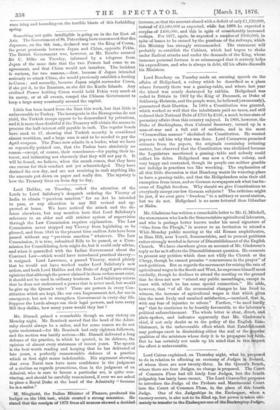The week has been one of the stormiest for a
hundred years back. The westward-flowing rivers, already swollen by heavy rains and the great snow-storm of Sunday last, have been so arrested by the violent western gales, that large parts of Paris are under water, some of the bridges over the Seine have become impassable, and the angle where the Marne and Seine unite has been transformed into a vast lake. The gale which swept over the north-west part of Europe between Sunday and Wednesday was certainly nearer to a tropical hurricane than any which has been known in this generation. In Normandy great trees were uprooted, and blocks of stone were hurled by the wind from the Calvados cliffs. . At Liege the barometer fell to a point lower than any point known there since barometers were invented, lower even than in the great hurricane of 1768. A nun in Brussels was said to have been whirled by the wind to a height of twenty feet, and then deposited again on the ground without hurt. Even in England, where the storm was not so terrific, barges have been swamped, the storeys of houses blown away, and telegraph-wires blown into the streets,—one of them unfortunately catching and guillotining the driver of a Brompton omnibus. Yesterday, too, snow fell again, and March certainly has not yet exchanged his lion-like for his lamb-like character. The change of temperature since this day week,—a soft and wonderfully mellow day,—has been sudden and violent. And, moreover, all the cold has come from the West,—as if the Atlantic were turning against us, and at once icing and hounding-on the terrible blasts of this forbidding spring.



































